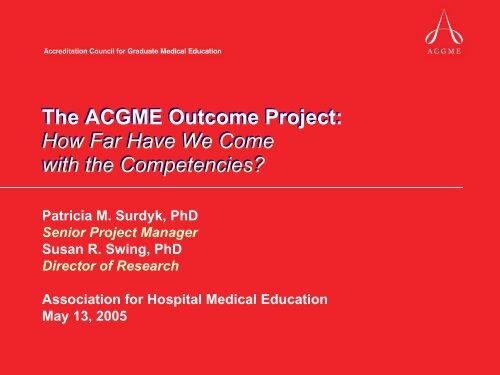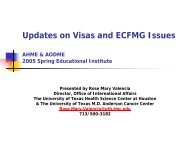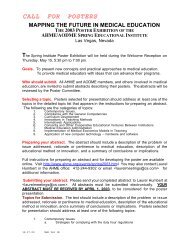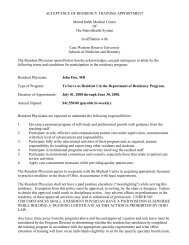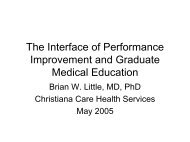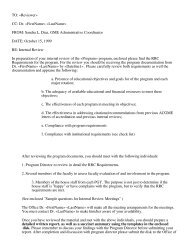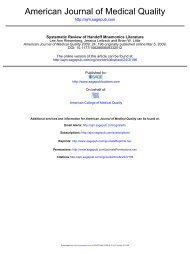Patricia Surdyk, PhD - Association for Hospital Medical Education
Patricia Surdyk, PhD - Association for Hospital Medical Education
Patricia Surdyk, PhD - Association for Hospital Medical Education
You also want an ePaper? Increase the reach of your titles
YUMPU automatically turns print PDFs into web optimized ePapers that Google loves.
The ACGME Outcome Project:<br />
How Far Have We Come<br />
with the Competencies<br />
<strong>Patricia</strong> M. <strong>Surdyk</strong>, <strong>PhD</strong><br />
Senior Project Manager<br />
Susan R. Swing, <strong>PhD</strong><br />
Director of Research<br />
<strong>Association</strong> <strong>for</strong> <strong>Hospital</strong> <strong>Medical</strong> <strong>Education</strong><br />
May 13, 2005
The ACGME Outcome Project:<br />
Do You Know Where You’re Going<br />
with the Competencies
Objectives<br />
<br />
<br />
<br />
<br />
Identify expectations of the ACGME regarding the progress<br />
residency programs are making integrating the Competencies<br />
Explain how the ACGME is measuring progress made by<br />
residency programs during Residency Review Committee site<br />
visits<br />
Discuss retrospective data <strong>for</strong> programs that have been site<br />
visited to date<br />
Reflect on insights gained through experience
Whatever we measure,<br />
we tend to improve.
“The Role of Assessment in a Learning<br />
Culture”<br />
“Assessment in the service of<br />
learning…”<br />
Lorrie A. Shepard<br />
http://www.aera.net/pubs/er/arts/29-07/shep01.htm
How should we change what we do so that<br />
faculty and residents look to assessment as a<br />
source of insight and help instead of an<br />
occasion <strong>for</strong> meting out rewards and<br />
punishment<br />
Paraphrased from Lorrie Shepard, AERA<br />
Presidential Address, April 2001
Common Program Requirements<br />
Common Program Requirements<br />
V.A. Program Design<br />
1. Format<br />
2. Goals and Objectives<br />
V.B. Specialty Curriculum<br />
V.D. ACGME Competencies<br />
VII.A. Resident<br />
1. Formative Evaluation<br />
2. Final Evaluation<br />
VII.C. Program
Expectations <strong>for</strong> Assessment<br />
<br />
<br />
<br />
<br />
<br />
Accurately assesses general competencies<br />
Provides <strong>for</strong> regular and timely feedback<br />
Supports per<strong>for</strong>mance improvement<br />
Verifies that residents can practice competently<br />
and independently<br />
Provides useful data <strong>for</strong> assessing program<br />
effectiveness
…it seems important to start with the <strong>for</strong>thright<br />
acknowledgement that no single assessment<br />
method can provide all data required <strong>for</strong><br />
judgment of anything so complex as the<br />
delivery of professional services by a successful<br />
physician.<br />
George Miller, 1990
The “Competent” Program: Phase 2<br />
The “Competent” Program: Phase 2<br />
Competencies integrated into curriculum<br />
Assessments aligned with goals and objectives<br />
(identify desired outcomes)<br />
Systematic assessment of competencies using tools<br />
that provide accurate, dependable results (determine<br />
which outcomes have been achieved)
The “Competent” Program: Phase 3<br />
Competencies integrated into curriculum<br />
Assessments aligned with goals and objectives (identify desired<br />
outcomes)<br />
Systematic assessment of competencies using tools that<br />
provide accurate, dependable results (determine which<br />
outcomes have been achieved)<br />
Residents’ per<strong>for</strong>mance data used to improve the program<br />
Prepare residents <strong>for</strong> life-long maintenance of competencies
Citations: RRC Examples<br />
<br />
<br />
<br />
<br />
Implementation is insufficient, must demonstrate<br />
effective plan to assess resident per<strong>for</strong>mance and<br />
utilize results to improve per<strong>for</strong>mance<br />
No <strong>for</strong>mal evaluation process <strong>for</strong> resident, faculty,<br />
program<br />
No final written evaluation verifying sufficient ability<br />
to practice competently and independently<br />
No semi-annual evaluation
Citations: RRC Examples (cont’d)<br />
<br />
<br />
<br />
<br />
<br />
No system to document resident experience in procedures<br />
Logs not discussed as part of semi-annual evaluation<br />
All faculty do not provide adequate verbal feedback;<br />
feedback is sporadic and attending dependent<br />
Minimal development of the faculty or the program <strong>for</strong><br />
implementation of the competencies<br />
Residents were not aware of the six competencies
Timeline<br />
<br />
<br />
<br />
<br />
Phase 1: Initial<br />
response<br />
Phase 2: Sharpening<br />
the focus<br />
Phase 3: Full Integration<br />
with learning and clinical<br />
care<br />
Phase 4: Develop<br />
models of excellence<br />
Role of the GMEC
Outcome Project:<br />
Phase 3 Expectations (7/06-6/11)<br />
Full integration of competencies and their assessment with learning<br />
and clinical care:<br />
Program/Institution Focus<br />
<br />
<br />
Use resident per<strong>for</strong>mance data to improve the<br />
program (provide evidence <strong>for</strong> accreditation review)<br />
Begin to use external measures (e.g., clinical<br />
quality indicators, patient surveys, employer evaluations of<br />
graduates, national or specialty standardized measures) to<br />
verify resident and program per<strong>for</strong>mance
The “Competent” Institution<br />
• Patient Care<br />
• <strong>Medical</strong> Knowledge<br />
• Practice-based Learning<br />
and Improvement<br />
• Interpersonal and<br />
Communication Skills<br />
• Professionalism<br />
• Systems-based Practice<br />
Institutional Requirements, I.A<br />
The purpose of GME is to<br />
provide an organized<br />
educational program with<br />
guidance and supervision of<br />
the resident, facilitating the<br />
resident's ethical, professional<br />
and personal development<br />
while ensuring safe and<br />
appropriate care <strong>for</strong> patients.
The “Competent” Institution<br />
• Patient Care<br />
• <strong>Medical</strong> Knowledge<br />
• Practice-based Learning<br />
and Improvement<br />
• Interpersonal and<br />
Communication Skills<br />
• Professionalism<br />
Institutional Requirements, I.B.2<br />
A Sponsoring Institution must<br />
be appropriately organized <strong>for</strong><br />
the conduct of GME in a<br />
scholarly environment and<br />
must be committed to<br />
excellence in both medical<br />
education and patient care.<br />
• Systems-based Practice
The “Competent” Institution<br />
• Patient Care<br />
• <strong>Medical</strong> Knowledge<br />
• Practice-based Learning<br />
and Improvement<br />
• Interpersonal and<br />
Communication Skills<br />
• Professionalism<br />
• Systems-based Practice<br />
Institutional Requirements, I.C.1<br />
A Sponsoring Institution must be<br />
in substantial compliance with the<br />
Accreditation Council <strong>for</strong><br />
Graduate <strong>Medical</strong> <strong>Education</strong><br />
(ACGME) Institutional<br />
Requirements and must ensure<br />
that its ACGME- accredited<br />
programs are in substantial<br />
compliance with the Institutional,<br />
common and specialty-specific<br />
Program Requirements.
The “Competent” Institution<br />
• Patient Care<br />
• <strong>Medical</strong> Knowledge<br />
• Practice-based<br />
Learning and<br />
Improvement<br />
• Interpersonal and<br />
Communication Skills<br />
• Professionalism<br />
• Systems-based<br />
Practice<br />
Institutional Requirements, I.C.3<br />
A Sponsoring Institution and its<br />
ACGME-accredited programs<br />
must be in substantial compliance<br />
with the ACGME Manual of<br />
Policies and Procedures <strong>for</strong> GME<br />
Review Committees (ACGME Web<br />
site, www.acgme.org). Of<br />
particular note are those policies<br />
and procedures that govern<br />
"Administrative Withdrawal," an<br />
action that could result in the<br />
closure of a Sponsoring<br />
Institution's ACGME-accredited<br />
program(s) and cannot be<br />
appealed.
The “Competent” Institution<br />
Accountable <strong>for</strong> what<br />
<br />
<br />
<br />
<br />
Administration<br />
Organization<br />
<strong>Education</strong><br />
Work Environment (including quality of patient<br />
care)
IRC Common Citations: Examples<br />
Residents not participating in learning the general<br />
competencies<br />
No participation in evaluating program/faculty<br />
No participation on institutional<br />
committees/councils<br />
No opportunities <strong>for</strong> resident participation in<br />
research
IRC Citations: (10/20-21/04)<br />
It is not apparent that all internal reviews are consistently<br />
addressing all of the common numerical duty-hour<br />
program requirements or the six general competencies.<br />
The institution and program are reminded that the<br />
ACGME is now in PHASE 2 of the Outcome Project<br />
which is “Sharpening the focus and definition of the<br />
competencies and assessment tools,” and to…
IRC Citations: (10/20-21/04-cont’d)<br />
+ …provide learning opportunities (as needed) in all six competency<br />
domains;<br />
+ improve evaluation processes as needed to obtain accurate<br />
resident per<strong>for</strong>mance data in all six competency domains; and<br />
+ provide aggregated resident per<strong>for</strong>mance data <strong>for</strong> the program’s<br />
GMEC internal review (ACGME Web site, Outcome Project,<br />
Timeline.)<br />
+ Programs and internal review reports should begin to address and<br />
document these ef<strong>for</strong>ts.
Two <strong>Education</strong>al Concepts<br />
The in<strong>for</strong>mal curriculum happens every time the student<br />
or resident is not in a class or on rounds, making it<br />
virtually everywhere and unavoidable, two<br />
characteristics that account both <strong>for</strong> its power and its<br />
complexity.
Two <strong>Education</strong>al Concepts (cont’d)<br />
The hidden curriculum includes the hidden transmission of<br />
the dominant culture during <strong>for</strong>mal classes. (Hundert, 1996)<br />
The hidden curriculum is…the curriculum of rules,<br />
regulations, and routines, of things teachers and students<br />
must learn if they are to make their way with minimum pain in<br />
the social institution called the school. (Jackson, 1968)
IRC Citation (10/20-21/2004)<br />
The Sponsoring Institution and its ACGME-accredited programs must<br />
provide an educational and work environment in which residents may raise<br />
and resolve issues without fear of intimidation or retaliation. This<br />
requirement is not being met in that in radiology, consultations, while<br />
readily available by experts, is unpleasantly provided. The radiologist<br />
apparently demeans the residents somewhat which makes the residents<br />
reluctant to ask <strong>for</strong> help. Members of the faculty are supposedly treated in<br />
the same way. In addition, there are turf battles between the Departments<br />
of Obstetrics-Gynecology and Anesthesiology over procedures. The<br />
institution and programs are reminded that two of the six general<br />
competencies are professionalism and interpersonal and communication<br />
skills defined as follows…
IRC Citation (10/20-21/2004-cont’d)<br />
Based on the above comments about the work<br />
environment, it does not appear that either competency<br />
is being taught by the programs, that program directors<br />
possess them, or that residents are being evaluated in<br />
them. In addition, it does not appear that the GMEC<br />
closely monitors the residents’ work environment or that<br />
there are resident evaluations of theirs programs and<br />
experiences given to the GMEC.
Conversations about Duty Hours<br />
Conversations about Duty Hours<br />
ACGME – “We will tell you exactly what to do to<br />
re<strong>for</strong>m duty hours.”<br />
Program Directors – “That won’t work <strong>for</strong> my<br />
program.”<br />
ACGME – “Every program must do the same thing.”<br />
Program directors – “You’ve got to be kidding.”
Conversations about Competencies<br />
Conversations about Competencies<br />
ACGME – “We invite you to respond to the challenge<br />
of assessing the competence of your residents.”<br />
Program Directors – “What would you like us to<br />
do”<br />
ACGME – “We don’t really know. Do something and<br />
we’ll let you know if you did the right thing.”<br />
Program Directors – “You’ve got to be kidding.”
How can we know what we think…<br />
…until we see what we say<br />
Karl Weick
Assessment Methods Reported<br />
Typical Methods (80% - 38% of programs)<br />
<br />
<br />
<br />
<br />
<br />
<br />
Global, clinical per<strong>for</strong>mance ratings<br />
In-training exams<br />
Focused observation (but not concurrent evaluation)<br />
Multi-rater/360° evaluation<br />
Evaluation Committee or meeting with PD<br />
Review of case/procedure logs (Surgical)
Assessment Methods Reported (cont’d)<br />
Other Methods (22% - 11% of programs)<br />
<br />
<br />
<br />
<br />
<br />
Formal oral exams<br />
In-house written exams<br />
Review of patient charts or records<br />
Structured case discussion<br />
Resident project report (portfolio)
Assessment Methods Reported (cont’d)<br />
Other Methods (10% - 5% of programs)<br />
<br />
<br />
<br />
<br />
<br />
<br />
<br />
Review of patient outcomes<br />
Standardized patients<br />
Anatomic or animal models<br />
Practice/billing audit<br />
Other Portfolio<br />
Stimulated Chart Recall<br />
OSCE
How Are Results Being Used (% prgs reporting)<br />
Method<br />
Clin Perf<br />
Rtgs<br />
Written<br />
Fdbck<br />
Oral<br />
Fdbck<br />
Educ<br />
Plan<br />
Assess<br />
Prgm<br />
Curric<br />
Change<br />
75% 90% 78% 56% 50% 41%<br />
ITE 70% 75% 33% 62% 74% 66%<br />
Focused<br />
Obs<br />
Decisions<br />
Multirater<br />
Eval<br />
Cmte<br />
Formal<br />
Oral<br />
OSCE<br />
69% 90% 52% 58% 36% 26%<br />
68% 89% 47% 44% 37% 26%<br />
71% 85% 74% 58% 46% 35%<br />
65% 87% 38% 43% 53% 36%<br />
63% 80% 25% 40% 47% 44%
RRCs’ Activities<br />
<br />
Pediatrics, Physical Medicine & Rehabilitation:<br />
revising Requirements around the competencies<br />
Urology: developing national web-based evaluation<br />
system (with ACGME Research & In<strong>for</strong>mation Technology<br />
staff)<br />
<br />
Emergency Medicine: identifying clinical quality<br />
indicators to use as measures of GME quality (with<br />
ACGME Research staff—funding from RWJ; Susan R.<br />
Swing, <strong>PhD</strong>, Principal Investigator)
RRCs’ Activities (cont’d)<br />
<br />
<br />
<br />
Radiation Oncology: refining specialty-wide assessment<br />
tools (with ACGME Research staff)<br />
Internal Medicine: pilot project to move from process to<br />
an outcome-based accreditation model<br />
<strong>Medical</strong> Genetics: developing curriculum resource<br />
guide (with ACGME Research staff)
RRCs’ Activities <strong>for</strong> the Future<br />
<br />
<br />
<br />
<br />
<br />
Agreement about citations<br />
Identify clinical quality indicators to use as<br />
measures of GME quality<br />
Develop an outcome-based accreditation model<br />
IRC – in<strong>for</strong>mation included in internal review report;<br />
GMEC actions based on findings<br />
Annual data reporting<br />
+ patient care; clinical experiences<br />
+ programs, institutions
Ruminations from the Road<br />
<br />
<br />
<br />
<br />
The competencies as organizing principles<br />
New and “improved” conversations<br />
Attention to basic principles<br />
“Grudging” acceptance


